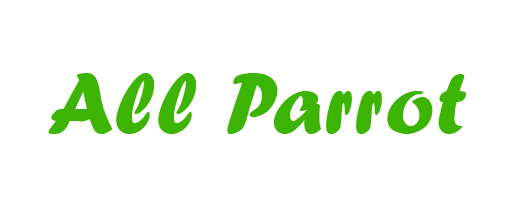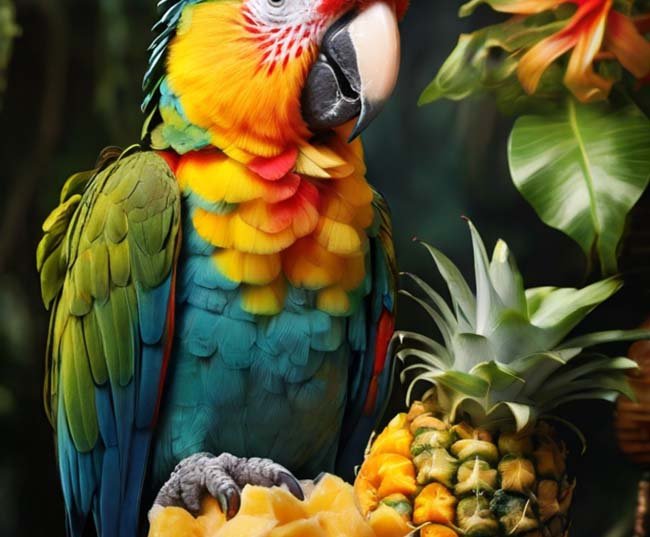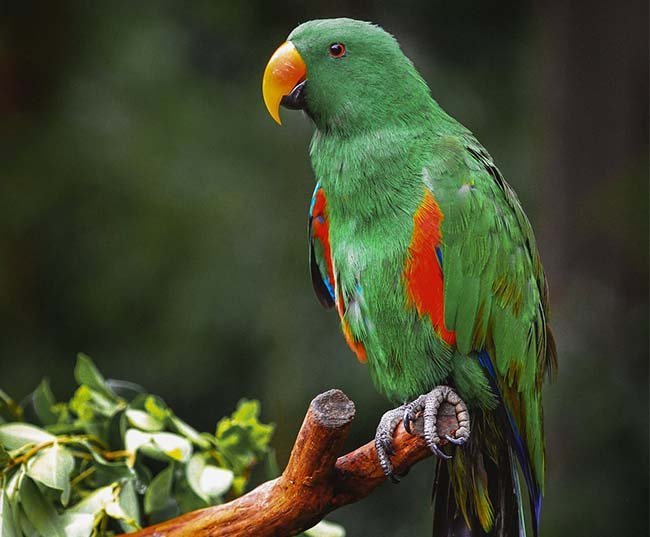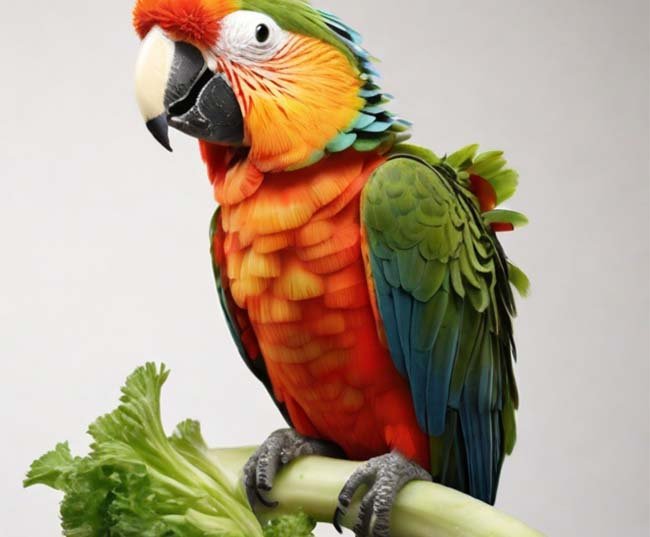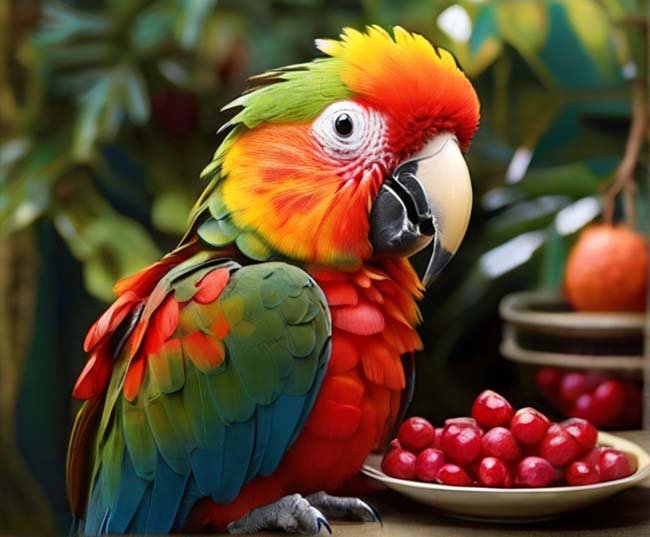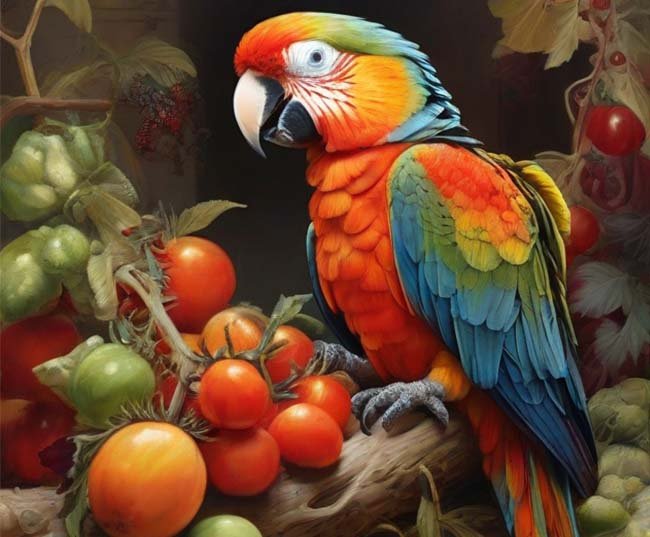Can Parrots Eat Strawberries? Parrot Diet Tips
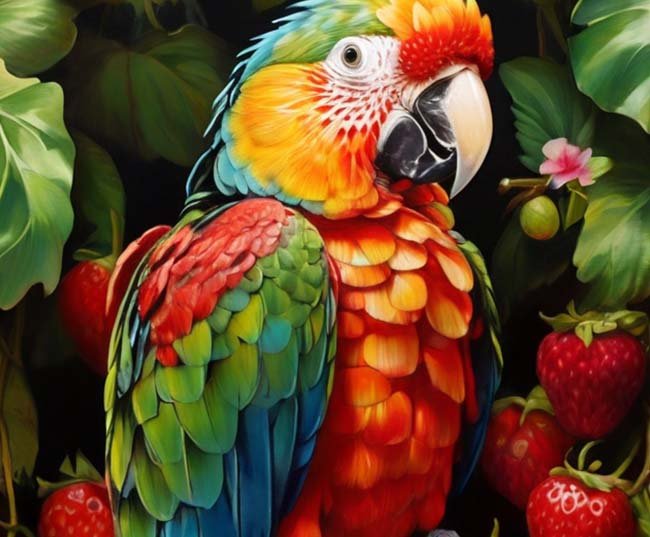
Welcome to the world of parrot nutrition. As a parrot enthusiast and expert, I understand the importance of providing our feathered friends with a well-balanced and nutritious diet.
One of the questions that often arises is, can parrots eat strawberries?
In this section, we will explore the safety and nutritional benefits of strawberries for parrots and provide helpful tips for incorporating this delicious fruit into their diet.
So without any delay, let’s get straight into it.
Key Takeaways:
- Strawberries can be a safe and nutritious addition to a parrot’s diet when introduced in moderation.
- A balanced diet is crucial to promote the overall health and well-being of parrots.
- If you have any concerns or questions regarding your parrot’s diet, consult with an avian veterinarian.
Can Parrots Eat Strawberries? – Explained
Yes, parrots can eat strawberries (including seeds & leaves) in moderation.
1). Understanding Parrot Diets and Nutritional Needs
As a responsible parrot owner, it’s crucial to understand the nutritional requirements of your feathered friend.
In the wild, parrots consume a diverse range of foods, including fruits, seeds, nuts, and vegetables.
A well-balanced parrot diet should mirror this diversity, providing all the necessary nutrients for your bird to thrive.
Parrots require a diet that is low in fat and high in fiber to maintain optimal health. Fatty foods can increase the risk of obesity, liver disease, and other health issues in parrots.
On the other hand, a diet that is too low in fat can lead to dry skin, dull feathers, and brittle nails.
When feeding your parrot, aim to provide a variety of foods to ensure a balanced diet.
Fruits such as apples, bananas, grapes, and berries can offer nutritional benefits and make for tasty treats.
Vegetables such as spinach, carrots, and bell peppers are also excellent choices. In addition, high-quality commercial parrot food can provide the necessary vitamins and minerals.
Read: Can Parrots Eat Bananas? Parrots Diet Guide
The Nutritional Benefits of Strawberries for Parrots
Strawberries are a nutritious fruit that can offer a range of health benefits for your parrot.
They are low in fat and calories and contain high levels of vitamin C, antioxidants, and fiber.
Vitamin C helps boost the immune system and promote healthy skin and feathers, while antioxidants can protect against damage from free radicals.
The fiber in strawberries can also aid in digestion and promote a healthy gut.
It’s important to note that while strawberries can be a healthy treat for parrots, they should be consumed in moderation.
Too many strawberries can lead to diarrhea and an upset stomach. When introducing strawberries to your parrot’s diet, do so gradually and monitor their response.
2). The Safety of Strawberries for Parrots
As with any new food you introduce to your parrot’s diet, it’s important to ensure it is safe and free from any potential toxins.
When it comes to strawberries, there are a few things to keep in mind.
Firstly, while strawberries are generally safe for parrots to consume, they do contain a small amount of oxalic acid.
In larger quantities, this can lead to a build-up of calcium oxalate crystals in the kidneys, which can cause health problems. However, it would take a significant amount of strawberries for this to occur.
To be safe, consider limiting your parrot’s strawberry intake to just a few small pieces at a time, offered infrequently as a treat.
Additionally, it’s important to carefully wash any fruit you offer to your parrot to remove any pesticides or other contaminants that could be harmful to your feathered friend.
Any strawberries should be organic, and free of chemicals that can affect your parrot’s health.
Remember, strawberries aren’t the only fruit that parrots can safely consume.
Consider offering a variety of parrot-friendly fruits, such as apples, bananas, and mangoes, to provide your feathered friend with a balanced and nutritious diet.
Read: Can Parrots Eat Tomatoes Safely? Parrot Diet tips
3). Health Benefits of Strawberries for Parrots
Strawberries are a great addition to a parrot’s diet due to their abundant nutritional benefits.
They are packed with vitamins, minerals, antioxidants, and fiber, which help maintain overall health and prevent disease.
Vitamin C
Strawberries are high in vitamin C, which is essential for the immune system and helps protect against infections.
Parrots, like humans, cannot produce vitamin C on their own and must obtain it through their diet.
Adding strawberries to their diet is an excellent way to ensure they get sufficient amounts of this vital nutrient.
Vitamin A
Vitamin A is essential for eye health, skin health, and strengthening the immune system.
Strawberries are an excellent source of this vitamin and provide numerous benefits, including maintaining good vision, preventing inflammation, and improving skin and feather quality.
Fiber
Parrots need fiber to maintain intestinal health, aid in digestion, and regulate blood sugar levels.
Strawberries are an excellent source of fiber and can contribute to overall gut health and bowel regularity.
Antioxidants
Strawberries are rich in antioxidants, which help prevent damage to cells and protect against various diseases and cancers.
Some of the antioxidants found in strawberries include anthocyanins, ellagic acid, and quercetin.
Incorporating strawberries into your parrot’s diet can provide numerous health benefits and contribute to their overall well-being.
As with any food, remember to introduce strawberries gradually and monitor your parrot’s reaction.
Read: Can Parrots Eat Grapes? Safety & tips Guide
4). Introducing Strawberries to Your Parrot’s Diet
As with any new food, it’s important to introduce strawberries to your parrot’s diet gradually to avoid upsetting their digestive system.
Here are some step-by-step guidelines to follow:
- Start by offering your parrot a small piece of strawberry.
- Watch your parrot’s reaction closely for the next few hours.
- If your parrot shows no signs of digestive upset, you can gradually increase the amount of strawberries offered over the next few days.
- Aim to offer strawberries as a treat rather than a staple in their diet. Any new food should only be introduced gradually so that any issues can be identified at an early stage.
Remember to always provide clean, fresh strawberries and remove any uneaten portions promptly to avoid spoilage which can be harmful to your parrots.
Additionally, make sure that the strawberries you provide are washed thoroughly to remove any potential chemical residues that could be detrimental to your parrots’ health.
5). Quantity and Frequency of Strawberry Consumption for Parrots
When it comes to incorporating strawberries into your parrot’s diet, it’s important to keep moderation in mind.
While a juicy, ripe strawberry can be a healthy and enjoyable treat for your feathered friend, it should not make up a significant portion of their daily intake.
So, how much strawberry is safe for your parrot?
As a general rule, no more than 10% of your parrot’s daily diet should consist of fruits, with the remainder split between a variety of vegetables, grains, and seeds.
Within that 10%, strawberries should be limited to just a few small pieces a few times a week.
It’s also essential to monitor your parrot’s response to consuming strawberries. Some birds may experience adverse effects, such as gastrointestinal upset or allergic reactions.
If you notice any negative changes in your parrot’s behavior or health, it’s essential to consult with a veterinarian immediately.
Here are some common FAQs regarding the quantity and frequency of strawberry consumption for parrots:
| Question | Answer |
|---|---|
| How often can I give my parrot strawberries? | It’s recommended to limit strawberry intake to a few small pieces a few times a week. |
| Can I feed my parrot only strawberries? | No, strawberries should make up no more than 10% of your parrot’s daily diet, with the remainder consisting of vegetables, grains, and seeds. |
| What are the signs of strawberry intolerance in parrots? | Signs of strawberry intolerance in parrots can include vomiting, diarrhea, or decreased appetite. If you notice any of these symptoms, stop feeding strawberries and consult with a veterinarian. |
By understanding the appropriate quantity and frequency of strawberry consumption for parrots, you can ensure a safe and balanced diet for your feathered friend.
Read: Can Parrots Eat Pomegranate? Safe Feeding Tips
6). Other Safe Fruits for Parrots
While strawberries are a great option for parrots, there are a variety of other safe and nutritious fruits that you can incorporate into their diet.
Here are some other parrot-friendly fruits to consider:
| Fruit | Nutritional Benefits |
|---|---|
| Apples | Apples are loaded with vitamin C, fiber, and antioxidants that can help boost a parrot’s immune system. |
| Bananas | Bananas are a rich source of potassium and vitamin C, which can help support heart health and boost the immune system. They are also low in calories and high in fiber, making them a healthy treat for parrots. |
| Grapes | Grapes contain vitamin C, potassium, and antioxidants that can help boost a parrot’s immune system. They are also a good source of hydration for birds. |
| Mango | Mangoes are a great source of vitamin A and fiber, which can help promote healthy vision and digestion in parrots. They are also very low in fat. |
| Papaya | Papayas are a rich source of vitamin C and antioxidants that can help boost a parrot’s immune system. They also contain digestive enzymes that can aid in digestion. |
These are just a few examples of safe fruits for parrots. As with strawberries, it’s important to offer these fruits in moderation and monitor your parrot’s response to ensure their health and safety.
7). Balancing a Parrot’s Diet with Strawberries and Other Foods
A balanced diet is essential for the overall health and well-being of parrots. While strawberries can be a nutritious addition to a parrot’s diet, they should not be the sole source of nutrition.
It’s crucial to include a variety of other foods to guarantee that your feathered friend’s nutritional requirements are met.
When creating a balanced diet for your parrot, consider incorporating the following:
| Food Group | Examples |
|---|---|
| Pellets | Roudybush, Harrison’s, Zupreem |
| Vegetables | Carrots, kale, broccoli, sweet potato |
| Fruits | Apples, bananas, mango, papaya |
| Protein | Chicken, eggs, legumes, tofu |
| Healthy Fats | Avocado, nuts, seeds |
Strawberries can be included in a parrot’s diet as part of the fruit group. Offer them in moderation, and ensure that they do not replace other essential sources of nutrition.
It’s also essential to wash fruits and vegetables before feeding them to your parrot.
Consult with an avian veterinarian or a certified avian nutritionist to create a personalized diet plan that meets the specific nutritional needs of your parrot.
Regular monitoring of your parrot’s health and dietary habits is essential to ensure their diet remains balanced and provides optimal nutrition.
8). Signs of Strawberry Allergies or Intolerance in Parrots
While strawberries are generally safe for parrots to consume, some individuals may have allergies or intolerances to this fruit.
It’s important to be aware of these potential issues and how to recognize the signs.
Symptoms of strawberry toxicity in parrots may include vomiting, diarrhea, excessive urination, or a lack of appetite.
These symptoms should be taken seriously and require immediate veterinary attention.
In addition to these physical symptoms, parrots may also exhibit behavioral changes if they are allergic or intolerant to strawberries. These changes could include lethargy, aggression, or excessive preening.
If you suspect that your parrot may be experiencing an adverse reaction to strawberries, it’s crucial to remove this fruit from their diet immediately and contact your avian veterinarian.
They can perform tests to confirm or rule out a strawberry allergy or intolerance and provide guidance on adjusting your bird’s diet to ensure optimal health.
9). Monitoring Your Parrot’s Health and Adjusting Diet as Needed
Keeping a watchful eye on your parrot’s health is essential to ensure that their diet is well-balanced and meets their needs.
Regular veterinarian checkups are a critical part of maintaining your parrot’s physical health.
During these visits, the vet will perform a thorough exam and recommend any necessary dietary changes.
However, as a pet owner, you can also monitor your parrot’s health at home by looking out for specific signs.
Some of the things you should watch for include changes in appetite, behavior, and energy levels. If you notice anything unusual, such as a decrease in appetite, lethargy, or listlessness, consult your vet immediately.
It’s also important to adjust your parrot’s diet as needed to ensure they receive the appropriate nutrients for their specific age, breed, and activity level.
Factors like climate, stress, and illness can also impact your parrot’s nutritional needs.
For example, parrots that are breeding or molting may require additional protein or calcium.
Adjusting your parrot’s diet to address these specific needs is crucial for maintaining their overall health and well-being.
Parrot Food FAQs
| FAQ | Answer |
|---|---|
| How often should I feed my parrot strawberries? | Strawberries should be considered a treat and fed to your parrot in moderation, usually once or twice a week. |
| How do I introduce strawberries to my parrot’s diet? | You can begin by offering a small piece of strawberry in your parrot’s regular food. Gradually increase the amount of strawberry over several days until your parrot is consuming a piece of strawberry daily. |
| What are some other safe fruits to feed my parrot? | Other safe fruits for parrots include apples, bananas, grapes, and melons. It’s important to research any new fruit before feeding it to your parrot to ensure it is safe and doesn’t contain any toxins or harmful substances. |
Overall, monitoring your parrot’s health and adjusting their diet as needed are crucial for ensuring they receive the appropriate nutrition to maintain their overall health and well-being.
By following the guidelines provided in this article and consulting with your veterinarian if needed, you can provide your parrot with a healthy and balanced diet that includes the occasional treat of strawberries.
Conclusion
Parrots and strawberries can be a delightful combination when introduced and consumed in moderation.
By following the guidelines provided in this article, I can provide my feathered friend with a well-balanced diet that includes the occasional treat of strawberries.
Remember to always prioritize your parrot’s health and consult with an avian veterinarian if you have any concerns or questions regarding their diet.
By doing so, I can ensure that my parrot’s diet is tailored to meet their individual needs and promotes optimal health and well-being.
In conclusion, parrots and strawberries: what you need to know is that strawberries can be a nutritious and enjoyable addition to a parrot’s diet.
By offering a well-rounded diet that includes a range of healthy foods, I can provide my parrot with the necessary nutrients for a happy and healthy life.
Frequently Asked Questions
Can parrots eat strawberries?
Yes, parrots can safely consume strawberries as part of their diet.
Why is a balanced diet important for parrots?
A balanced diet is crucial for the overall health and well-being of parrots. It provides them with the necessary nutrients to thrive.
What are the nutritional benefits of strawberries for parrots?
Strawberries are rich in vitamins, minerals, and antioxidants, which can support a parrot’s immune system and promote overall health.
Are strawberries safe for parrots to eat?
Yes, strawberries are generally safe for parrots to consume. However, it’s important to remove the stems and seeds before offering them to your parrot.
How should I introduce strawberries into my parrot’s diet?
When introducing strawberries to your parrot’s diet, start with small amounts and closely monitor their response. Gradually increase the quantity over time.
How much and how often should my parrot eat strawberries?
It is recommended to offer strawberries to your parrot as an occasional treat, not as a primary food source. Limit the quantity to a few small pieces a couple of times a week.
What are some other safe fruits for parrots?
There are several safe fruits that parrots can enjoy, including apples, oranges, bananas, and grapes. Always remove any seeds or pits and provide them in moderation.
How can I ensure my parrot’s diet is balanced?
To maintain a balanced diet for your parrot, incorporate a variety of fresh fruits, vegetables, grains, and a good quality parrot pellet. Consult with an avian veterinarian for personalized advice.
What are the signs of strawberry allergies or intolerance in parrots?
Common signs of strawberry allergies or intolerance in parrots may include digestive issues, skin irritations, or changes in behavior. Consult with a veterinarian if you notice any concerning symptoms.
How can I monitor my parrot’s health and make necessary diet adjustments?
Regularly observe your parrot’s behavior, appearance, and droppings. If you notice any significant changes, consult with a veterinarian to determine if adjustments to their diet are needed.
